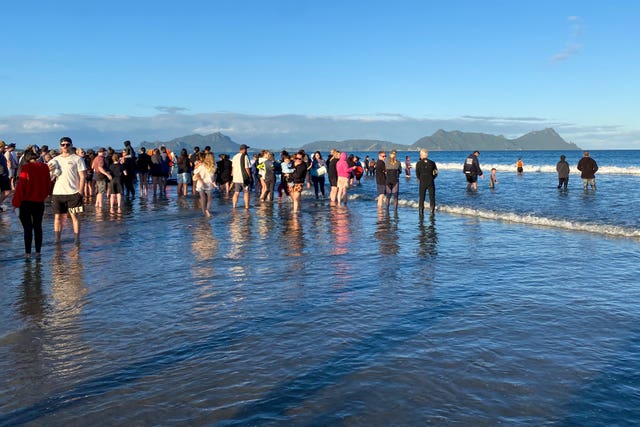
More than 30 pilot whales stranded on a beach in New Zealand have been safely returned to the ocean after conservation workers and residents helped to refloat them by lifting them on sheets.
Four of the pilot whales died, New Zealand’s conservation agency said.
The island nation is a whale stranding hotspot and pilot whales are especially prolific stranders.
A team was monitoring Ruakaka Beach near the city of Whangarei in New Zealand’s north on Monday local time to ensure there were no signs of the whales saved on Sunday stranding again, the Department of Conservation told The Associated Press.

The agency praised as “incredible” the efforts made by hundreds of people to help save the foundering pod.
“It’s amazing to witness the genuine care and compassion people have shown toward these magnificent animals,” Joel Lauterbach, a Department of Conservation spokesperson, said in a statement.
“This response demonstrates the deep connection we all share with our marine environment.”
A Maori cultural ceremony for the three adult whales and one calf that died in the stranding took place on Monday.
New Zealand’s Indigenous people consider whales a taonga — a sacred treasure — of cultural significance.
New Zealand has recorded more than 5,000 whale strandings since 1840.
The largest pilot whale stranding was of an estimated 1,000 whales at the Chatham Islands in 1918, according to the Department of Conservation.
It is often not clear why strandings happen but the island nation’s geography is believed to be a factor.
Both the North and South Islands feature stretches of protruding coastline with shallow, sloping beaches that can confuse species such as pilot whales — which rely on echolocation to navigate.


Why are you making commenting on The National only available to subscribers?
We know there are thousands of National readers who want to debate, argue and go back and forth in the comments section of our stories. We’ve got the most informed readers in Scotland, asking each other the big questions about the future of our country.
Unfortunately, though, these important debates are being spoiled by a vocal minority of trolls who aren’t really interested in the issues, try to derail the conversations, register under fake names, and post vile abuse.
So that’s why we’ve decided to make the ability to comment only available to our paying subscribers. That way, all the trolls who post abuse on our website will have to pay if they want to join the debate – and risk a permanent ban from the account that they subscribe with.
The conversation will go back to what it should be about – people who care passionately about the issues, but disagree constructively on what we should do about them. Let’s get that debate started!
Callum Baird, Editor of The National
Comments: Our rules
We want our comments to be a lively and valuable part of our community - a place where readers can debate and engage with the most important local issues. The ability to comment on our stories is a privilege, not a right, however, and that privilege may be withdrawn if it is abused or misused.
Please report any comments that break our rules.
Read the rules here